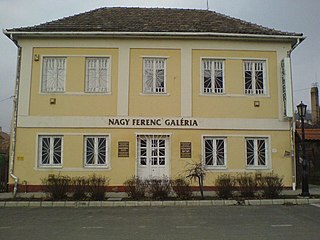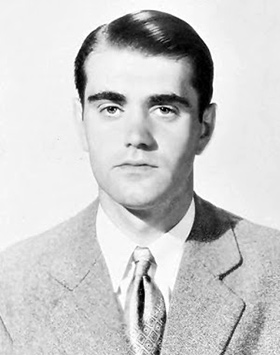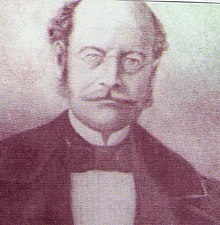
Count Lajos Batthyány de Németújvár was the first Prime Minister of Hungary. He was born in Pozsony on 10 February 1807, and was executed by firing squad in Pest on 6 October 1849, the same day as the 13 Martyrs of Arad.

Tab is a town in Somogy County, Hungary, and the seat of Tab District. It is situated approximately 175 km South West of Budapest and 22 km from Lake Balaton.
The history of the Jews in Latin America began with conversos who joined the Spanish and Portuguese expeditions to the continents. The Alhambra Decree of 1492 led to the mass conversion of Spain's Jews to Catholicism and the expulsion of those who refused to do so. However, the vast majority of conversos never made it to the New World and remained in Spain slowly assimilating to the dominant Catholic culture. This was due to the requirement by Spain's Blood Statutes to provide written documentation of Old Christian lineage to travel to the New World. However, the first Jews came with the first expedition of Christopher Columbus, including Rodrigo de Triana and Luis De Torres.
Hungarian Canadians are persons in Canada of Hungarian ancestry. According to the 2016 Census, there are 348,085 Canadians of Hungarian ancestry. The Hungarian minority is the 24th largest ethnic group of Canada. The bulk of Hungarian immigration occurred after World War II, with the wave peaking after the 1956 Hungarian revolution against communist rule, when over 100,000 Hungarian refugees went to Canada. The Hungarian Canadian community is among the country's multiple ethnicities; Canada is one of the top five countries of the Hungarian diaspora.

Greek Uruguayans are Uruguayan residents either fully or partially of Greek descent or Greece-born people who reside in Uruguay.
Carlos Vegh Garzón was a Uruguayan politician.

Alejandro Végh Villegas was a Uruguayan politician.

Foreign relations exist between Armenia and Uruguay. Uruguay, as a small South American nations hosts a large Armenian community for its size. The Armenian community in Uruguay totals approximately 16,000 people.

Carlos A. Végh is a Uruguayan academic economist who, since 2013, is the Fred H. Sanderson Professor of International Economics at the Johns Hopkins School of Advanced International Studies (SAIS), and holds a joint appointment with Johns Hopkins' Department of Economics. He is also a research associate at the National Bureau of Economic Research since 1998. He was the World Bank's chief economist for Latin America and the Caribbean from February 1, 2017 to June 30, 2019, while on leave from Johns Hopkins. He was previously a professor of economics and vice-chair of undergraduate studies at UCLA (1996-2005) and professor of economics at the University of Maryland (2005-2013). His research work on monetary and fiscal policy in emerging and developing countries has been highly influential in both academic and policy circles. In particular, his work on fiscal procyclicality in emerging markets has been instrumental in generating a copious literature on the subject, which has influenced the adoption of fiscal rules in many emerging markets.
Indian Uruguayans form a small expatriate community consisting mostly of businessmen, Indian employees of TCS and some Catholic nuns. As of January 2016, about 83 Indians hold permanent residency in Uruguay. A further 733 Indians reside in the country on long-term visas, most of whom are employed by TCS in Montevideo. A small number of Indians from the Gujarati and Sindhi communities work as importers and run retail outlets of Indian textiles and handicrafts in Uruguay.

The history of the Jews in Uruguay dates back to the colonial empire. Perhaps the most important influx of Jewish population was during the 20th century, due to World War I and World War II. Uruguay's Jewish community is mainly composed of Ashkenazi. Uruguay is home to the fifth largest Jewish community in Latin America after Argentina, Brazil, Mexico, and Chile respectively, and the second largest as a proportion of the total population after Argentina.

The German community in Uruguay numbers ca. 10,000 German expatriates and 40,000 people of German descent. Most of them live in the Montevideo area, although there are German minorities in Paysandú, Río Negro, San José and Canelones.

Hungary–Uruguay relations refers to the bilateral relations between Hungary and Uruguay. Both nations are members of the United Nations. Neither country has a resident ambassador.

The city of Vienna, Austria is home to a long-established Hungarian community dating back to the 1500s. Beginning in the 17th century, Vienna became an important cultural center for Hungarians. During the time of the Austro-Hungarian Empire (1867-1918) and the early 1990s, Hungarians were the second largest non-German speaking population in Vienna after the Czechs. After the dissolution of the Austro-Hungarian Empire, many of the Viennese Hungarians returned to Hungary. Today, Vienna is home to a small Hungarian population of around 27,000.
Cuban Uruguayans are people born in Cuba who live in Uruguay, or Uruguayan-born people of Cuban descent. As of 2019, there were 24,485 Cubans living in Uruguay.

Russian Uruguayans are people born in Russia who live in Uruguay or Uruguay-born people of Russian descent. They are a local ethnic minority.
Austrian Uruguayans are people born in Austria who live in Uruguay or Uruguayan-born people of Austrian descent.
Uruguayan Jews in Israel are Jewish immigrants and descendants of the immigrants of the Uruguayan Jewish communities, who now reside within the state of Israel.











